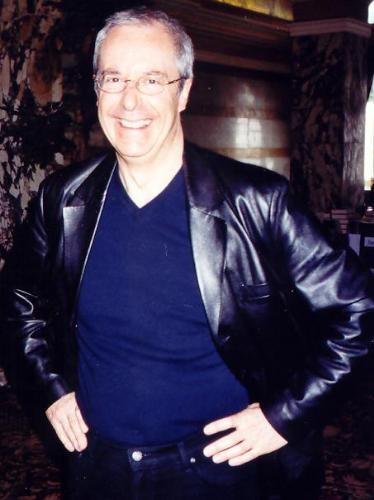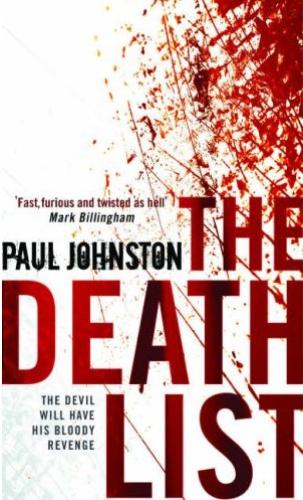|
Have
you ever felt like killing someone? No, seriously, really killing someone? I
won't believe that you haven't. Ex-wife, boyfriend, boss, Tony Blair, Margaret
Thatcher, anyone who plays any sport for England (oops, sorry, nationalist
intrusion there)…you get the gist. From time to time, we all obsess over doing
away with the people who upset us most.
Example: last summer in Athens, we
were tyrannised late at night by the sound of a TV at terminal volume from the
adjoining block of flats. I went up to the roof-terrace to remonstrate with the
individual concerned, an old git in his underwear who told me where I could go.
So I did - back downstairs, where I loaded up with oranges, which I then threw
with the power and accuracy of a former cricketer through the open window of the
said old git's flat. He came out in utter fury, attempted unsuccessfully to
throw the oranges back and then said, with his eyeballs popping, "I'm going to
kill you". Of course, I laughed it off, even though back home in Scotland a
verbal threat is legally as serious as a physical one. Funnily enough, the TV's
volume went down after that. But I'm one hundred per cent positive that at that
specific moment our delightful neighbour meant what he said, even if he thought
better of it subsequently - I haven't been found knifed in an Athenian gutter.
My point is, the propensity for
violence is an indubitable characteristic of human beings - from schoolyard
bullies of both genders ganging up against the fattest/ the thinnest/ the most
attractive/ the ugliest/ the best off/ the worst off of their age-group; to
road-rage; to Columbine and Virginia Tech; to Iraq; to, I fear, the whole world.
The question is, do crime novelists handle violence, and more specifically, the
urge to violence with sufficient depth and understanding?
Well, I'm not going to answer that
question - partly because I'm terrified of my fellow authors' propensity for
violence. Rather, I'm going to examine my own approach to violence in my latest
book, The Death List. Here's the set-up. Matt Wells is a crime novelist
whose life is on the skids - he's been dumped by his wife, his agent and his
publisher. (No link to my own life. Oh no.) Scraping a pittance from music
reviews and failing abysmally to write himself out of the crisis, Matt is thrown
an apparent lifeline. A devoted fan pays him to write the story of the said
fan's life. The problem is, he's a ruthless killer, who calls himself the White
Devil. He soon shows Matt that he's playing hardball and the cost of any failure
(what you might call literally failing to meet his deadline) or the involvement
of the police will be the mutilation and murder of a loved one. Matt is
desperate concerned for the safety of his eight-year-old daughter, so
reluctantly he plays along.
OK, stop right here. Forget the
issue of likelihood. If you were in that or a similar position, what would you
do? Call the police? Fatal. The guy's got your house wired for sight and sound,
plus he's scanning your mobile frequency. You don't know how many sidekicks he's
got watching you, either. Hire a private eye? Forget it. PIs in the UK check out
whether your future neighbours are noisy (see above) and the like. They're no
use against a vicious
killer. Well, it seems to me that
you would do what Matt does - humour your persecutor, stall for time, assess his
strengths and weaknesses. Matt has got a couple of advantages that the average
crime writer doesn't have, though. He played amateur Rugby League until a couple
of years back (name me a crime writer who's recently been involved in a contact
sport - no, seriously, I'd like to know), plus he has a group of mates who were
also players. Oh, and one of them used to be in the SAS. Unlikely? Not really. I
was at university with a guy who was a Royal Marines officer in the Falklands
and I certainly wouldn't mess with him. Anyway, the bottom line is, how far
would you go to protect your nearest and dearest? Or put it the other way. What
wouldn't you do to save your children? The answer to the last question is
nothing, am I right?
So Matt obediently writes up the
White Devil's horrible exploits. But there's a moral issue here. Being a crime
writer who's desperate to kick-start his career, he's also got an eye on the
main chance - the Devil's story could be worth a fortune. We all know how
desperate publishers are for books about real serial killers. And Matt's
frantically trying to protect his family and friends, as well as work out the
killer's motives.
Then the oranges really hit the
glass. The White Devil comes up with another Death List. This time, it contains
the names of people who have wronged Matt - a critic who wrote hurtful reviews,
the agent who let him go (I hate that expression - dumped him is what happened),
the editor who pulled the plug on his career and so on. But here's the killer,
so to speak, twist. The victims are despatched in ways Matt used in his books.
So suddenly he's a suspect as well as a victim. Again I ask you, in his position
what would you do? You can't go to the cops because they'll bang you up and then
you'll be no use to your kids and friends. I know what I'd do. Like Matt, I'd
fight back: use my mates to track him down, and then nail his ass. But the White
Devil's no pushover. He's been hoping Matt would be provoked into action and
he's waiting, like a monster in the darkness, like a tarantula on your
bedclothes (yes, I nicked that from a James Bond movie), like a very hungry
snake in the grass…
There you have it. The Death
List was written fast to keep the pace at breakneck levels, and revised at
leisure to make sure it makes sense on different levels. Oh, and I almost forgot
to mention the frequent references to the wonderfully gory and in your face
Jacobean revenge tragedies - one of which, some of you will know, was called
The White Devil. I had a lot of fun with those, even though revenge is
basically a human urge that is deeply unpleasant.
Perhaps that's why people read
crime novels - to purge their unwholesome desires. If so, you'll all be much
healthier if you include The Death List on your summer reading…list.
The Death List,
published by MIRA in the UK and USA in June/ July 2007, is Paul Johnston's ninth
novel. He is a past winner of John Creasey and Sherlock awards. For more
information on The Death List and his other work, please go to:
www.paul-johnston.co.uk
|






